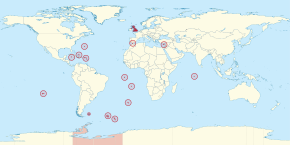
Back Britse oorsese gebiede Afrikaans Territorio Britanico d'Ultramar AN Bryttisc landbunes ANG أقاليم ما وراء البحار البريطانية Arabic اقاليم ما وراء البحار البريطانيه ARZ Territoriu Británicu d'Ultramar AST Böyük Britaniyanın dəniz əraziləri Azerbaijani بریتانیا خاریجی تورپاقلاری AZB Britische Ibaseegebiete BAR Брытанскія заморскія тэрыторыі Byelorussian
British Overseas Territories | |
|---|---|
| Anthem: "God Save the King" | |
 Location of the United Kingdom and the British Overseas Territories | |
| Sovereign state | United Kingdom |
| Largest territory | British Antarctic Territory |
| Official languages | English |
| Demonym(s) |
|
| Government | Devolved administrations under a constitutional monarchy |
• Monarch | Charles III |
| Keir Starmer | |
| David Lammy | |
| Stephen Doughty | |
| Area | |
• Total | 18,015[a] km2 (6,956 sq mi) |
| Population | |
• 2019 estimate | 272,256 |
| Date format | dd/mm/yyyy |
The British Overseas Territories (BOTs) are the fourteen territories with a constitutional and historical link with the United Kingdom that, while not forming part of the United Kingdom itself, are part of its sovereign territory.[1][2][3] The permanently inhabited territories are delegated varying degrees of internal self-governance, with the United Kingdom retaining responsibility for defence, foreign relations, and internal security, and ultimate responsibility for "good"[clarification needed] governance.[4][5] Three of the territories are chiefly or only inhabited by military or scientific personnel, the rest hosting significant civilian populations. All fourteen have the British monarch as head of state.[6] These UK government responsibilities are assigned to various departments of the Foreign, Commonwealth and Development Office and are subject to change.
Cite error: There are <ref group=lower-alpha> tags or {{efn}} templates on this page, but the references will not show without a {{reflist|group=lower-alpha}} template or {{notelist}} template (see the help page).
- ^ "Supporting the Overseas Territories". UK Government. Archived from the original on 6 October 2014. Retrieved 8 November 2014.
There are 14 Overseas Territories which retain a constitutional link with the UK. .... Most of the Territories are largely self-governing, each with its own constitution and its own government, which enacts local laws. Although the relationship is rooted in four centuries of shared history, the UK government's relationship with its Territories today is a modern one, based on mutual benefits and responsibilities. The foundations of this relationship are partnership, shared values and the right of the people of each territory to choose to freely choose whether to remain a British Overseas Territory or to seek an alternative future.
- ^ "British Overseas Territories Law". Hart Publishing. Archived from the original on 21 June 2020. Retrieved 19 June 2020.
Most, if not all, of these territories are likely to remain British for the foreseeable future, and many have agreed modern constitutional arrangements with the British Government.
- ^ "United Kingdom Overseas Territories – Toponymic Information" (PDF). Present Committee on Geographic Names. Archived (PDF) from the original on 11 May 2022. Retrieved 7 January 2023. – Hosted on the Government of the United Kingdom website.
- ^ "Representing the Overseas Territories in the UK Parliament and Government". UK Parliament (House of Commons Library). UK Government. 7 February 2023. Retrieved 14 January 2024.
All the Territories have a UK-appointed Governor, who generally holds responsibility for managing the Territory's external affairs, defence and internal security like the police, and often the power to make or veto laws.......As a matter of constitutional law, the UK Parliament has unlimited power to legislate for the Territories. However, passing legislation for the Territories is rare.
- ^ Leonard, Tom (11 June 2009). "British anger over Bermuda decision to take Guantanamo detainees". The Telegraph. Archived from the original on 10 January 2022. Retrieved 22 April 2017.
We've underlined to the Bermuda Government that they should have consulted with the United Kingdom as to whether this falls within their competence or is a security issue, for which the Bermuda Government do not have delegated responsibility. We have made clear to the Bermuda Government the need for a security assessment, which we are now helping them to carry out, and we will decide on further steps as appropriate.
- ^ "What is the British Constitution: The Primary Structures of the British State". The Constitution Society. Archived from the original on 6 October 2014. Retrieved 15 November 2014.
The United Kingdom also manages a number of territories which, while mostly having their own forms of government, have the Queen as their head of state, and rely on the UK for defence and security, foreign affairs and representation at the international level. They do not form part of the UK, but have an ambiguous constitutional relationship with the UK.
